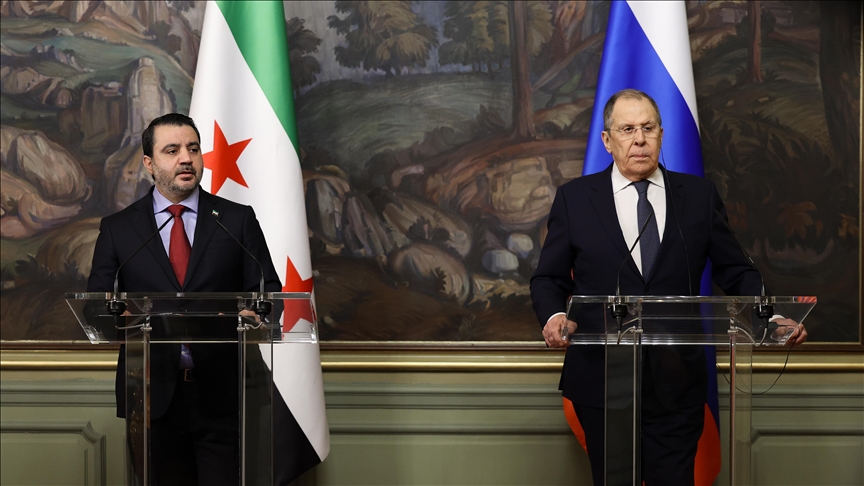Moscow, Damascus oppose Israel's aggressive actions against Syria
Russian foreign minister urges end to using Syria for geopolitical confrontation, while top Syrian diplomat says Israel exploiting 'minorities card' to undermine his country's sovereignty
 Russian Foreign Minister Sergey Lavrov (R) and Syrian Foreign Minister Asaad al-Shaibani (L) hold a press conference after their meeting in Moscow, Russia on July 31, 2025.
Russian Foreign Minister Sergey Lavrov (R) and Syrian Foreign Minister Asaad al-Shaibani (L) hold a press conference after their meeting in Moscow, Russia on July 31, 2025.
MOSCOW
Moscow and Damascus on Thursday expressed opposition to Israeli aggression against Syria, condemning Tel Aviv's recent actions towards its neighbor.
"Russia has consistently opposed the exploitation of Syrian territory for geopolitical rivalries or as a battleground for other states’ disputes," Russian Foreign Minister Sergey Lavrov said at a news conference in Moscow following talks with his Syrian counterpart Asaad al-Shaibani.
Lavrov voiced hope that Syria would successfully navigate its current challenges.
"The recent sharp escalation in (southern Syria's) Suwayda province, as well as earlier events on the Syrian coast, underscore the persistent challenges facing Syria’s leadership and society at this stage," Lavrov noted, warning: "All members of the international community must avoid actions that risk further escalation."
He also endorsed the initiative of the International Committee of the Red Cross to establish a presence in Suwayda, stating it would "help stabilize the situation and prevent recurrences."
"We are convinced that lasting normalization in Syria requires inclusive dialogue. We hope the measures announced by the transitional government of President (Ahmad) al-Sharaa will directly advance these goals," Lavrov added.
The minister also backed Syria’s upcoming September parliamentary elections, emphasizing their role in fostering national reconciliation.
"We reaffirm our commitment to Syria’s unity, independence, and territorial integrity, and we are prepared to support post-conflict reconstruction," he noted.
Lavrov also thanked the Syrian leadership for the steps they are taking to ensure the safety of Russian citizens and Russian facilities within the country's borders
The minister reported that during the meeting, he had agreed with his Syrian counterpart to conduct an inventory of all existing agreements.
“There were some contacts, but today we decided that this process should become regular. Issues concerning cooperation in the field of security and training personnel (both civilian and military)—all this is of interest to our Syrian colleagues,” he said.
Regarding trade and economic agreements and contracts, Lavrov said he had agreed with Shaibani that Damascus would expedite the appointment of its co-chairman in the bilateral intergovernmental trade and economic commission.
“On our part, there is already a chairman. As soon as the Syrian component of this mechanism is formed, we will ask this intergovernmental body to review all existing agreements and contracts to find mutually beneficial, mutually acceptable ways for Russia’s participation in assisting the recovery of the Syrian economy,” he noted.
Lavrov emphasized that internationally, lifting all sanctions against the Syrian people would have special significance.
He noted that Russia has never supported such Western decisions, nor allowed any sanctions to be advanced in the UN Security Council.
“Now our American and European counterparts are gradually beginning to lift certain sanctions step by step. This movement is in the right direction. But we believe it is necessary to completely abolish these sanctions once and for all. They harmed only the Syrian people, not those politicians who claimed to be targeted by them,” Lavrov concluded.
Syrian foreign minister says Israel exploiting 'minorities card'
Syria's foreign minister, for his part, said Israel is exploiting the "minorities card" to justify interference in the country’s internal affairs.
Shaibani asserted that the country’s Druze community is being manipulated to fracture Syrian society, reinforcing the claim that Damascus cannot protect all of its citizens.
"Israel systematically targets populated areas in the Suwayda province to incite civil unrest, potentially even reigniting civil war. It is critical that no party—especially Israel—exploits the 'minorities card' to justify interference in Syria’s internal affairs," he stressed.
He also underscored Syria’s lack of aggressive intent toward Israel, noting the government’s focus on postwar reconstruction and public exhaustion after over a decade of civil war.
"The Syrian government is responsible for all its people, not select minorities. We will not allow this narrative to be weaponized again," he declared.
On bilateral ties, Shaibani described the meeting as opening "a new chapter in Russian-Syrian relations," adding: "Our nation seeks deepened cooperation with Russia."
He emphasized that Moscow had "unequivocally confirmed the absolute sovereignty of the Syrian Arab Republic" during transparent discussions with Lavrov.
"Syria’s path to stability and recovery is impossible without halting Israel’s attacks, witnessed globally. These strikes violate international law and humanitarian norms while sabotaging our nation’s reconstruction and stabilization," he said.
Shaibani also welcomed Russia’s firm rejection of Israeli military actions, noting their talks had addressed Moscow’s role in Syria’s economic revival.
"Our discussions included Russia’s role in Syria’s economic recovery, grounded in international law and our people’s interests. Our partnership will not dwell on the past but advance through shared responsibility and mutual respect," he said.
Damascus aims to regain its traditional position on the international stage and intends to establish partnership relations with other countries, primarily in the interests of the Syrian people, he concluded.
Anadolu Agency website contains only a portion of the news stories offered to subscribers in the AA News Broadcasting System (HAS), and in summarized form. Please contact us for subscription options.







